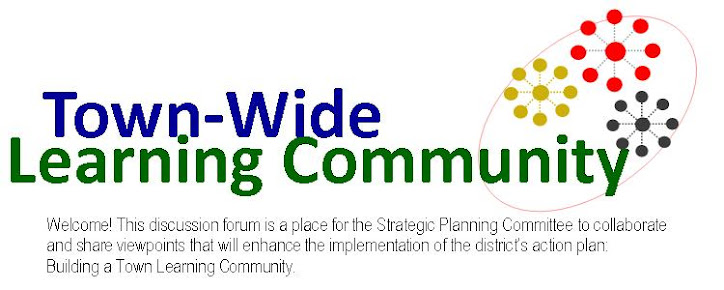I hope I can add to the discussion today with feedback about a research publication I found on the Harvard Family Research Project web site. The research discusses lessons learned from community organizing -- and two concepts in particular resonated with me. One, I think the differences between 'parent involvement' and 'community organizing' are relevant to our work. Second, I believe there is application to our work on the Town Learning Community in the quote below.
Specifically, the quote theorizes that an obstacle to systemic improvement of student achievement is the act of "individualizing" issues. By developing relationships and connecting people, schools provide opportunities to identify systems issues that are not the result of an individual, but rather problems that are the responsibility of the organization to develop solutions for.
"Education organizing invests in building relationships among parents as the foundation of action. It focuses on “relational power,” which is the power to act collectively in order to make system change (Cortés, 1993). All too often schools individualize systemic problems (C. Brown, personal communication, October 3, 2003). For example, a student might be faulted for poor performance when in reality the problem also lies in a lack of qualified teachers and instructional materials. Organizing counters this individualizing trend by bringing people into relationships with one another so that they can identify and act on school issues. Through one-on-one conversations, group dialogue, and reflection, parents and other residents develop a strong sense of community, and learn how to use their collective power to advocate for school change. In contrast, parent involvement approaches that focus on individual skill building rarely provide opportunities for dialogue about common problems. The absence of these opportunities often precludes parents’ working together for school improvement."(Giles, 1998)
If you think this applies to our work moving forward, a theory of action about the Town Learning Community might be:
"If we provide opportunities for people to develop relationships with one another so that they can identify and act on school issues, they will develop a strong sense of community and learn how to use their collective power to advocate for school change, resulting in more students achieving the district's standards."
I've provided the link to research on the Harvard web site on the Message Board. I'd also like to suggest that we all read the research since it's rather brief and use it for a text-based discussion at one of our meetings. Through such a discussion, we might talk about the research, this proposed theory of action, and how to test its application to our work. We might also discuss whether this could help to form the basis for a focus question in our World Cafe forum.